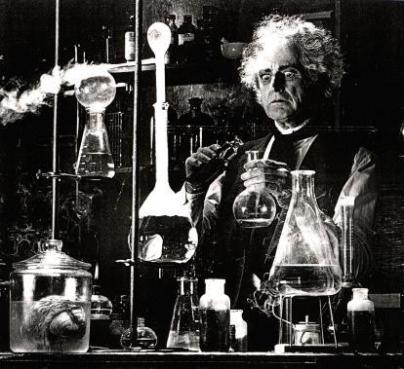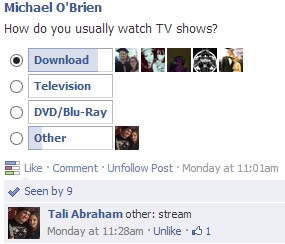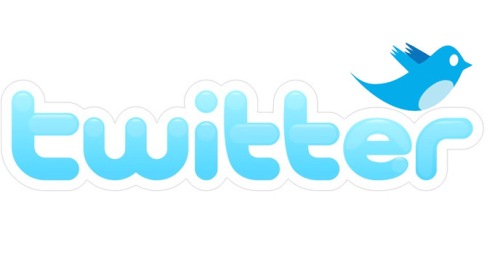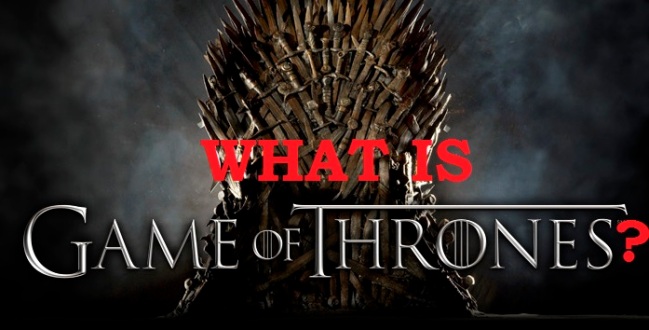The Results
I have been running the Facebook group “Game of Thrones Season 3 – Convergence Assignment” since the 29th of March, 2013, and with 14 members, countless images, videos, songs, and other random content, it has been almost impossible to distill it into something small and coherent. Hopefully this blog has been able to represent a neat slice of the data and discussions shared over the last 6 weeks.
WHAT HAVE WE DONE?
Over the last 6 weeks, the group and I have sat down every Monday evening and watched the latest episode of Game of Thrones together. Why, you ask? The reason is that the series, like Star Trek, The X-Files and Buffy the Vampire Slayer before it, has expanded beyond the small screen to become a cultural phenomenon, a communal joy shared across the world by millions of television viewers and internet users.
As mentioned previously, television is no longer a casual pastime enjoyed by families in their living rooms. This last decade, television series have climbed the entertainment ranks to become as highly produced and creatively written as Hollywood films. Premium cable channel HBO is the main culprit behind the increase in quality, with shows like The Sopranos, The Wire and Boardwalk Empire being critically lauded as some of the best television ever produced.
So, as hardcore fans of Game of Thrones, my friends and I felt it would be enjoyable to experience the show together each week and then talk about it amongst ourselves on the Facebook group. Of course, merely talking about the show for one day a week would not suffice, and we quickly began making daily posts, with content ranging from the hilarious to the downright weird. It is absurd how much Game of Thrones-related material you can find with a quick Google search.
WHAT HAVE WE LEARNED?
For the purpose of this project, I thought it would be interesting to experience the show through different mediums, therefore exploring the concept of technological convergence. Several members of my group downloaded the series, while others streamed it from a website; one person would always stream the show through their Xbox. Rather than illegally downloading the episodes, I chose to purchase an iTunes season pass, which is the version that we all watched together.
I quickly learned that the legal version of Game of Thrones I acquired through iTunes was vastly superior to the torrented version; it is a 1.9GB HD rip, with flawless image and sound quality, and downloads as soon as the content is available.
Despite passing on this information to people, many still chose to torrent the series. I believe they did this for several reasons, the largest being BECAUSE THEY CAN. It became quite clear to me that with so many methods of acquiring the product available to the consumer, the studios and productions companies would never be able to force them to choose just one (especially when that particular method would cost money). For this reason, studios are having to invent new ways to retain their audience and compete with the piracy epidemic.
Technological convergence has allowed the television industry to market itself like never before. Studios like HBO are able to advertise Game of Thrones through social networking sites, such as Twitter and Facebook. There are Thrones apps available for iPads, a video game on Ps3, Xbox and PC. The internet is the most invaluable source of self-promotion, with countless banners and pop-up ads visible on news websites, video streaming sites such as YouTube and Vimeo, and HBO’s own site. Fans of the series are even inadvertently advertising the series themselves, by making remix videos, memes, and writing fan-ficiton, generating word-of-mouth promotion that can’t be manufactured by the studios.
CONCLUSION
Since the introduction of the internet, we have been living in the swift and unpredictable Digital Age. Each piece of technology does not serve one singular purpose as it might have 20 years ago; today, gaming consoles can stream television programs, while televisions act as computers, and mobile phones as mp3 players. Technological convergence has seen different devices move towards being able to perform similar roles.
Game of Thrones is caught in the eye of the technological storm, being consumed by viewers through televisions, computers, tablets, gaming consoles, and mobile phones. Technological convergence has changed the way that consumers receive, interpret, and share new media. My Facebook group has been no exception, as it has allowed my friends and I to experience the series as a community. Other social networking sites such as Twitter have allowed me to branch outside of my own communal bubble and communicate with fans from all around the world. Social media has even given the fans access to the producers and stars of the series, further breaking down the barrier between creator and consumer.
Technological Convergence has allowed for the creation of new media, as well as the re-interpretation of old media. As technology continues to evolve and mutate, so will the studios and the audience. The possibilities on the horizon for future media are endless.
Game of Tweets
As well as posting content on the Game of Thrones convergence Facebook group, I have also been regularly updating my Twitter account with thoughts, reviews, and random content relating to the program. I found that by posting on Twitter and ‘following’ other Game of Thrones related accounts, I was able to interact directly with fans across the globe and grasp a better understanding of the viewership.
Posted below are some examples (click on the image to enlarge):
Culture Jamming
The convergence of online technologies has changed the “way we create, consume, learn and interact with each other” (Jenkins, 2006).
The purpose of this blog is to explore the way in which we experience, consume, and interpret new technologies in the 21st century, using Game of Thrones as an example. Watching a television program is no longer a personal experience shared by families and friend – it is a global event, experienced simultaneously by millions within the online community. Each television series has developed its own online presence, and as soon as the newest episode has finished airing, there are guaranteed to be hundreds of thousands of reviews, blog posts, video reactions, and remixes posted online. Thanks to the convenience and immediacy of Twitter, people in the online community will often discuss the episode and make predictions while the program is still airing.
THE FACEBOOK GROUP
I have decided to use social networking as a means to explore this topic, as it allows for an open flow of communication and combines many forms of media. I have created and maintained a Facebook group over the last 5 weeks that has acted as venue for my friends and I to experience the series together. The group has collected many videos, images, surveys, and website links related to Game of Thrones, as well as prompting healthy discussion about the series.
The post below is the first I posted in the group, requesting that members participate in uploading content:
As you can see, the second reply I received was a YouTube link for a fan-made video that combines aspects Game of Thrones and Star Wars. This appropriation of the two texts is a form of ‘culture jamming’, combining two forms of mass media for a satirical purpose. It also further proves the popularity of Game of Thrones, as the hype and love surrounding the series is being compared to the monolithic Star Wars.
There were many other examples of images and video that satirised and subverted the material that were uploaded to my Facebook group. See results below:
The video below shows a Sydney University that rigged its bell to play the Game of Thrones theme song.
Some members linked YouTube videos to the Facebook group that were animated parodies of the series.
Others linked podcasts and reviews of the program:
INTERNET MEMES
“A meme is a concept, catchphrase or byword that spreads from person to person” (Schubert, 2003) Internet memes are ideas – usually expressed as images – that respond to pop culture in an often humourous manner.
Game of Thrones is no exception. There have been hundreds of memes uploaded to my Facebook group that satirise Thrones and other pop culture phenomenons, ranging from Iron Man to World of Warcraft.
References
- Henry, Jenkins (2006), Convergence Culture, New York University Press, New York
- Schubert, Karen (2003), Bazaar Goes Bizarre, USA Today. Retrieved 2007-07-05.).
Getting Down the Basics
Okay, let’s start with what I plan to achieve with this blog.
The core aim of this project is to address the convergence of television and online media across several mediums, and explore how it has changed the way we, as consumers, experience and interpret new media.
In order to understand the convergence of television and online media, we must first understand the product. Game of Thrones is a US fantasy television series produced by premium cable channel HBO. The story is set in the fictional continent of Westeros, and follows the struggles of several families to conquer and claim the throne that governs the Seven Kingdoms.
The program is notable for having an enormous budget for a television series, with “the reported budget for season one [being] about $60 million; costs increased by roughly 15% for season two” (Jurgensen, 2012). This large season budget is similar to that of a mid-priced Hollywood film, which is evidence that television is becoming a more legitimate form of media and studios are now willing to take higher risks on their programs.
HBO’s gamble paid off, with strong promotion and word-of-mouth on the internet propelling the series to break ratings records and eventually eclipse it’s predecessors as the most popular series on HBO. The ratings continue to rise with each episode, ensuring that Game of Thrones will be around to break records for the next few years.
References:
1. Jurgensen, John (2012), A Bigger, Pricier ‘Game of Thrones’, The Wall Street Journal, viewed online 2nd May 2012, <http://online.wsj.com/article/SB10001424052702303404704577309432008018946.html>






















